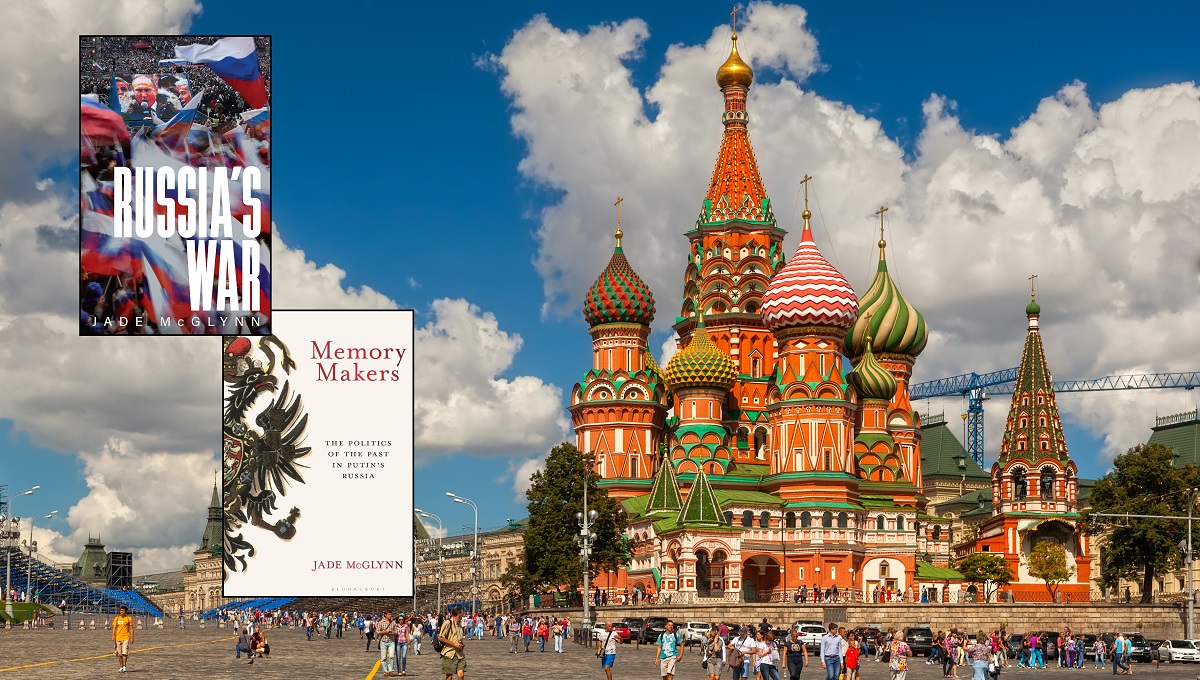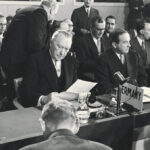
EDITOR’S NOTE: This episode was recorded in October 2023 but due to technical difficulties we were unable to publish until now. It’s still as relevant as the day it was recorded.
It’s time for another episode in our On Writing series, and joining host Michael Neiberg in the virtual studio is author and Russia specialist Jade McGlynn. Jade is the author of Russia’s War and Memory Makers: The Politics of the Past in Putin’s Russia, and her extensive study of Russian culture offers fantastic insights into Russia and Putin’s motives in Ukraine. Their conversation delves into her initial interest in Russia and the academic career that led to a thorough understanding of Russia’s actions in Ukraine present day.
It was the story of how the state and society had co-created or co-written this story with increasingly extreme chapters about who they were, who Russia is, why Russia is a nation, why Russia is special and Russia’s role in the world. And then when the full scale invasion began…I realized that I understood some of the questions that people were asking.
Podcast: Download
Subscribe: Apple Podcasts | Spotify | Amazon Music | Android | Pandora | iHeartRadio | Blubrry | Podchaser | Podcast Index | TuneIn | Deezer | Youtube Music | RSS | Subscribe to A Better Peace: The War Room Podcast
Jade McGlynn is an academic based at War Studies, King’s College London, and author of two books: Russia’s War and Memory Makers: The Politics of the Past in Putin’s Russia.
Michael Neiberg is the Chair of War Studies at the U.S. Army War College.
The views expressed in this presentation are those of the speakers and do not necessarily reflect those of the U.S. Army War College, U.S. Army, or Department of Defense.
Photo Description: View of the St. Basil Cathedral from Vasilyevski spusk, Moscow, Russian Federation
Photo Credit: Anton Zelenov via Wikimedia Commons





From a Russian — but also from a worldwide — point of view, might the need to accumulate sufficient historical, cultural, identity and other resources — so as to combat the threat posed by Western universalism and/or liberalism — might this be the powerful and compelling motivational factor that — both here at home in the U.S./the West and there abroad elsewhere — oh so easily overrides and marginalizes problems such as “the truth?”
Note that — from the perspective that I provide above — it is not so much “Russia’s War” and “Memory Makers: The Politics of the Past in Putin’s Russia” that we are witnessing today. Rather, what we are witnessing today is “The World’s War” and “Memory Makers: The Politics of the Past in Nearly Every Country” (to include our own) today.
From that such perspective:
a. Is it really of any great benefit to study the innumerable cultures, histories , traditions, etc. of the various countries of the world? (While this might tell us something about what is being “weaponized” against us — and tell us something about how these such matters are being changed, modified, etc., so to better achieve this such goal — it does not tell us/it does not address nor does it take necessary consideration of — why this occurring both at home and abroad.)
b. Or (accordingly) is it more important that we (a) study why this is occurring/what is causing this, (b) whether this has occurred in the past and, if so, (c) what can we learn from the past; this, about how to handle such a worldwide — both at home and abroad — phenomenon?
In this latter regard (see my item “b” above), do the following two items help?:
“In this new world disorder, the power of identity politics can no longer be denied. Western elites believed that in the twenty-first century, cosmopolitanism and globalism would triumph over atavism and tribal loyalties. They failed to understand the deep roots of identity politics in the human psyche and the necessity for those roots to find political expression in both foreign and domestic policy arenas. And they failed to understand that the very forces of economic and social development that cosmopolitanism and globalization fostered would generate turbulence and eventually resistance, as ‘Gemeinschaft’ (community) fought back against the onrushing ‘Gesellschaft’ (market society), in the classic terms sociologists favored a century ago.” (See the Mar-Apr 2017 edition of “Foreign Affairs” and, therein, the article by Walter Russell Mead entitled “The Jacksonian Revolt: American Populism and the Liberal Order.”)
“The expansion of Europe has been a much-discussed process. Unfortunately the publicists’ and historians’ interest has commonly been limited to surface aspects of power, to political, economic, and intellectual penetration. Yet a closer acquaintance reveals the existence of a yet deeper layer of hostile infiltration, a subtler and more subversive onslaught on native values and traditions. The ‘underground’ portions of western expansion have hitherto rather escaped notice, let alone analysis, although among their victims their force was felt deeply if confusedly. Thus an anonymous journalist writing in Russia late in 1896 pointed to that melting away of native guideposts under the western impact when he lamented that ‘under the influence of historical conditions and progress many phenomena which distinguished Russian nationality are now changing and therefore prove no longer to be genuine and unchangeable…’ No hallowed custom, no authority remained unimpaired, even though the surface structure of society and government was preserved and the sovereignty of the state untouched. The termites of western influence were eating away the substance and left only facades. And the invisible portion of western power, its ability to serve as a universal model, proved in the long run even more devastating than armies, battleships, or stocks and bonds.” (See the June 2009 Cambridge University Press, Comparative Studies in Society and History, and the abstract of the article “Imperial Russia at the Turn of the Century: the Cultural Slope and the Revolution from Without” by Theodore H. Von Laue.)
(Herein, as to this last quoted item about Russia a century ago, [note the last three words of Walter Russell Mead’s quoted item above], is this not recurring — on a worldwide basis — [a] once again today and [b] for a similar reason?)